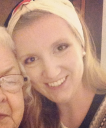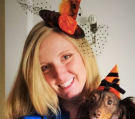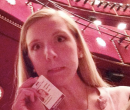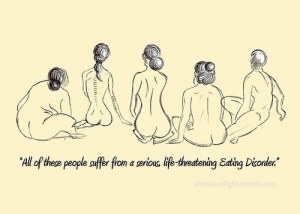In many cultures, Friday is considered unlucky. Sailors don’t start voyages on Fridays, people freak out if it falls on the 13th, and it’s the name of a really annoying song. It’s also the day that Jesus was crucified, which means that many Christians around the world (myself included) at the very least will not eat meat on Fridays during Lent (which is now). I’m drafting this post as it’s almost dawn on Friday, and I’m preparing for a day that won’t necessarily be unlucky, but will certainly be insanely busy.
As a Christian, an adult, and a well-educated person, I’m not supposed to believe in superstitious things like luck.
But I still do.
Psychologists call it “magical thinking.” For me, magical thinking entails things like skipping the 13th song to come up on my iPod’s shuffle, always wearing something with a flower on it, and putting my mirror away before leaving the house; if I don’t, I’ll get a bad grade, fall on the sidewalk, get yelled at, never get married, or — most horrifying of all — gain a pound. (Fun fact: the number of songs I skip after the 13th is inversely related to how many pounds I’ll gain.)
Magical thinking is a well-known feature of OCD. Although I don’t have full-blown OCD, it was helpful when my therapist identified my magical thinking and we began to work on recognizing its occurrence. She was able to name this demon in part because OCD and OCPD are common among those with EDs.
This long example finally leads to my point: when people ask what it’s like to live with an ED, it’s not accurate for me to just describe my food and weight complexes. It involves so much more than that, and the other things it involves are important to know. If you suspect or know that you or a friend has an ED, these are all things to be aware of.
I freely give the disclaimer that everything I describe below is only my experience with each comorbidity, and experiences vary across the board. If what I describe doesn’t sound like you or a friend, don’t necessarily rule it out. Always speak to a licensed professional or call NEDA at 1-800-931-2237 (or email info@myneda.org, or go to nedawareness.org and “click to chat”) if you’re concerned.
Anxiety, on a good day, is that feeling you get right when the nurse says “little pinch” right before sticking you with a needle. It’s not the actual pain, it’s the feeling that comes before the pain. With anxiety, though, you don’t get the relief of the needle stick.
On a bad day, anxiety is like a migraine or a stomach bug. You lie curled up in bed all day repeating your pleas to God over and over: please take it away. Please please please take it away. Make it stop. Please.
Depression has two weapons. One is a sharp dagger it uses to carve words like worthless and lazy and fat and alone and stupid into your skin, digging deep until metal hits bone. When you’re alone, you can curl up and lean into the pain, but in public you have to act like you’re not having knives plunged into you over and over. Sometimes the dagger cuts so deeply that people notice the scars, and when they ask about them, the dagger flies to your throat and presses so hard you can feel your pulse against it. You lie to people — no daggers here, don’t worry, move along — just to make the threat subside.
Its other weapon is a shield. It looks innocent enough at first; shields keep you safe, right? It’s huge and heavy and you run behind it, hoping it will protect you from the daggers — and it does. Slowly, though, you realize that it’s also keeping everything else out. Pain and fear are gone, but so are humor, curiosity, energy, and motivation. You may realize that you’ve grown comfortable with the shield and laid down under it, but now its weight is crushing you. You can’t get up.
The most insidious thing about the dagger and the shield is that, no matter which one it’s using on you, they both have a way of winning you over to their side. Maybe you don’t want the carving to stop, or you like that crushing feeling that separates you from the rest of the world. Maybe you like it so much — or you just realize that the dagger will always be stabbing, the shield always crushing — that depression convinces you that the only way out to let its weapons kill you.
Substance abuse starts as the cutest, most charming guy you’ve ever met. When you’re with him, you feel like you’re floating. Everyone laughs at how smitten you are, because your puppy love is adorable and eccentric. At first.
Eventually you’re officially dating this guy. Your friends may not like him anymore — they think he’s around too much, and it’s getting annoying — but they don’t know him like you do. You see him every day, and you’re no longer lonely or tired or worried. He gives you confidence and makes you laugh. Everything is brighter when he’s with you.
You get to a point where you’ve been dating for a while and you still can’t get enough of him, so you decide to move in together. Now that he’s around 24/7, you see his nastier habits. Your space is always a mess, he never lets you get any work done, and you often get sick from him. He becomes possessive, making you sneak him with you everywhere you go. You two used to just go to parties and on dates together, with the occasional brunch or special day-long event thrown in, but now he’s tagging along with you to meetings, errands, classes, work, and even church. Your friends say that he smells bad, that he’s clumsy, that he always has your attention and leaves you distracted and glassy-eyed when you try to talk to anyone else, but you’re so used to it that you don’t care. You can’t function without him by your side anymore. You can’t tell where he ends and you begin.
You think you’ve found the one, the answer to all your problems. Your friends, coworkers, and teachers don’t understand how essential he is to you. You love him… until one day, out of the blue, something random sets him off and he beats the living daylights out of you. You wake up in the hospital, then go home to find that your friends have kicked him out. This will be a rough breakup.
Depending on a lot of factors, you may eventually be able to reconcile with him and have a conversation every once in a while. (I’m lucky, and somewhat unusual, that this is the case for me.) You always have to be on your guard, though, for when he’ll try to turn on the charm and start the relationship again.
Trauma is just a dream. You remember it as a haze, the only things in sharp focus being the random details: the crunchy leaves lining the sidewalk outside, the pizza box on the counter, the numubness in the pit of your stomach as you walked home. Like a recurring nightmare, though, sometimes it all comes rushing back without warning. You walk down that street and remember why you usually avoid that route. You see someone that resembles the villain from your dream and try to figure out where to run. You wake up with a start in the middle of the night, coated in a sheen of sweat and shame.
(Other common comorbidities include borderline personality disorder, bipolar disorder, and full-blown obsessive compulsive disorder, thankfully none of which I’m qualified to describe. Once again, though — if you or a friend are struggling, please educate yourself about these conditions.)
The last and greatest among these for me is, of course, the eating disorder. EDs turn your body into a vessel for a bratty little kid calling the shots from inside you. Like a child from a horror movie, the kid is sweet and charming at first. I need to help you, she says. I can make all this go away. I know the answer, and it’s being thin. If you’re thin, you’ll be worth loving. I can make you delicate, feminine, fragile. Just follow every word I say and the anxiety will cease fire, the depression will stop harassing you, you’ll be independent from your substances, and trauma will loosen its grip as you become a totally different person from the one who experienced that. By the time you figure out the this kid is actually a monster trying to kill you, your brain has already been rewired to listen to every word she says. Don’t worry, she makes you think. I’m helping you take your life back. I’m making you into who you want to be. She makes you forget that the “person you want to be” is actually the person she wants to be. She has taken over your brain, and you don’t even know your own self anymore.
I don’t want this post to sound morbid or scary. I don’t want anyone’s pity or fear. What I hope is that, by posting these realities, someone may no longer “have no idea” what life with this illness can entail. This week is about awareness, and these are the things I hope everyone is aware of, leading them to recognize the seriousness of the ED epidemic and the importance of taking action to stop it.







